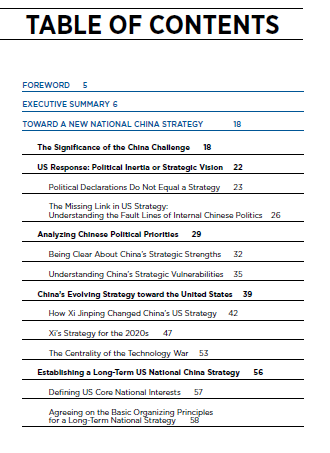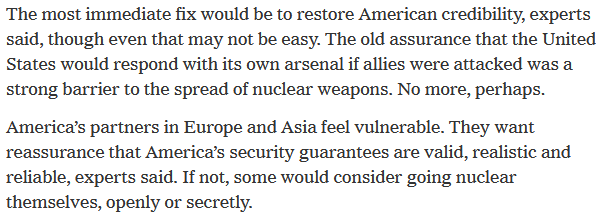
Let's talk about that "Longer Telegram" making the rounds...and why it's a

https://t.co/rHikkOYuoT

Kennan is even apologetic about that fact, as he writes at the beginning, "I apologize in advance for this burdening of telegraphic channel"

Oh, and it wasn't "Anonymous", it was "X"

Nearly every page of the "Executive Summary" is a list.
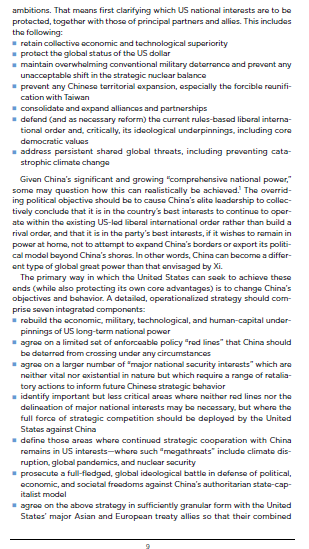
I mean, here's a page that makes the bold move of transitioning from a bullet point list to a number list....
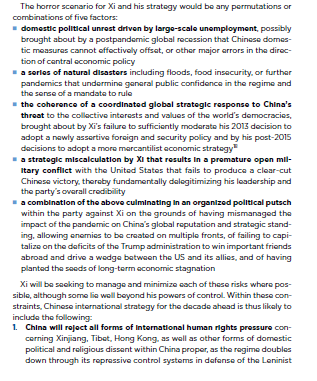
Even then, none of the lists had 17 (SEVENTEEN!) points!
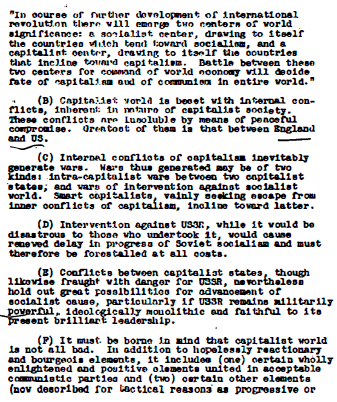
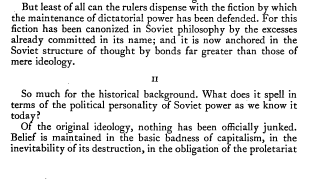
MOST of it is about the Soviet Union itself. Indeed, 4 of the telegram's 5 parts focus on the USSR.
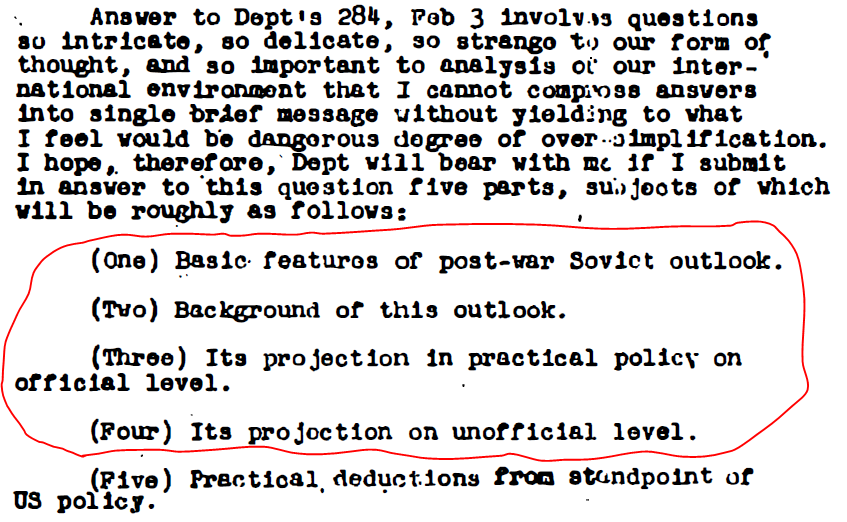
The key point is that USSR typically backs down when confronted. Therefore, a show of strength & resolve should result in the US never having to actually use force

If you're playing buzz-phrase bingo, mark "Liberal International Order"
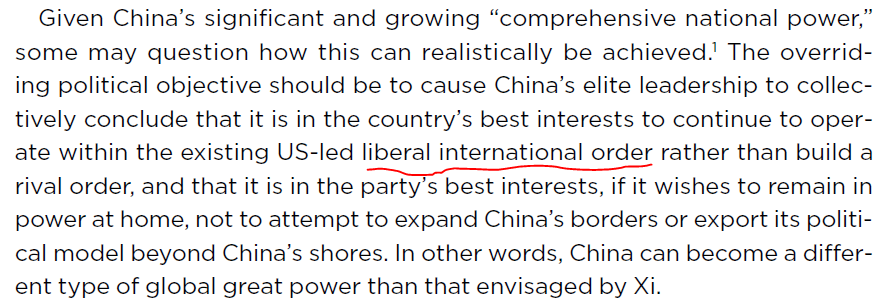
It's been said better (& more economically) elsewhere.
For example, see this @CarnegieEndow report by @MiraRappHooper, @Michael_S_Chase, Matake Kamiya, Shin Kawashima, & @Yuichi_Hosoya.
https://t.co/CqOnaq2Gp1
https://t.co/zvonnh78IS
https://t.co/bdfGhpBFjL
The full version of this anonymously authored "Longest Telegram" is fascinating in some ways, but the attempt to claim Kennan's mantle is hobbled by questionable assumptions and logical contradictions. Thread: (1/x) https://t.co/5CliU03uKB
— Eric Hundman | \u4f55\u8af3\u92b3 (@ehundman) January 29, 2021
More from Paul Poast
Why are civil-mil scholars upset about Austin Lloyd's nomination as the 28th Secretary of Defense?
Consider the nomination of the 3rd Secretary of Defense: George Marshall
[THREAD]

In 1950, Truman wanted to fire the second SecDef, Louis Johnson, and install George Marshall as Secretary of Defense.
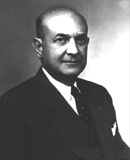
There was a problem: when the Department of Defense was created in 1947, section 202 of the 1947 National Security Act (which created the DoD, then called "The National Military Establishment") would not allow recently retired officers to serve as SecDef
https://t.co/bWx4h1OFah

Marshall had only retired as a 5-star General in 1947
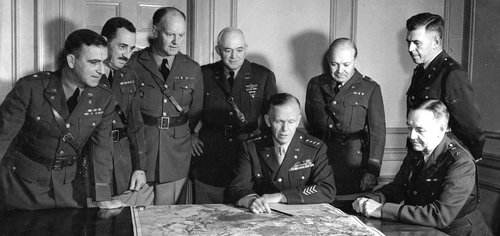
Of course, by 1950 Marshall had already served as Secretary of State and had proposed the "Marshall Plan" for the recovery of Europe
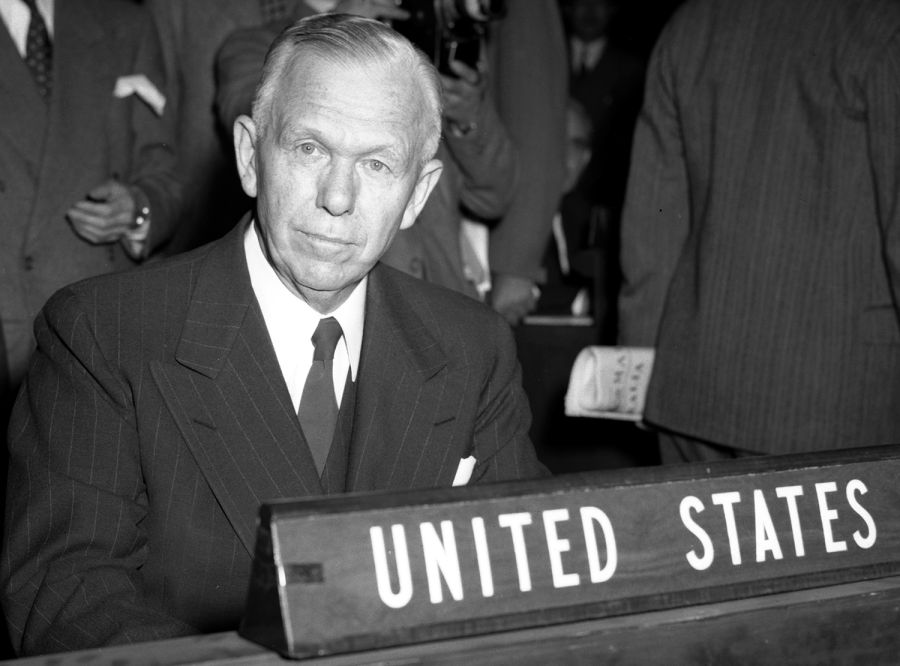
Consider the nomination of the 3rd Secretary of Defense: George Marshall
[THREAD]

In 1950, Truman wanted to fire the second SecDef, Louis Johnson, and install George Marshall as Secretary of Defense.

There was a problem: when the Department of Defense was created in 1947, section 202 of the 1947 National Security Act (which created the DoD, then called "The National Military Establishment") would not allow recently retired officers to serve as SecDef
https://t.co/bWx4h1OFah

Marshall had only retired as a 5-star General in 1947

Of course, by 1950 Marshall had already served as Secretary of State and had proposed the "Marshall Plan" for the recovery of Europe

Is it true that democracies don't go to war with each other?
Sort of. But I wouldn't base public policy on the finding.
Why? Let's turn to the data.
[THREAD]
The idea of a "Democratic Peace" is a widely held view that's been around for a long time.
By 1988, there already existed enough studies on the topic for Jack Levy to famously label Democratic Peace "an empirical law"

The earliest empirical work on the topic was the 1964 report by Dean Babst published in the "Wisconsin Sociologist"

Using the war participation data from Quincy Wright's "A Study of War", Babst produced the following two tables
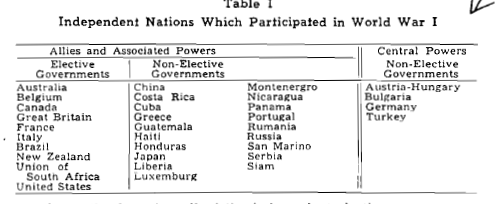
The tables show that democracies were NOT on both sides (of course, Finland is awkward given that it fought WITH Nazi Germany against the Soviet Union).
Babst expanded his study beyond the World Wars in a 1972 paper in Industrial Research. He confirmed his finding.
Sort of. But I wouldn't base public policy on the finding.
Why? Let's turn to the data.
[THREAD]
Democracies do not go to war with each other. There are a lot of empirical data to support that theory. I summarize that literature here. https://t.co/SQLk9J9rZ8 https://t.co/tLlSyisEIU
— Michael McFaul (@McFaul) December 12, 2020
The idea of a "Democratic Peace" is a widely held view that's been around for a long time.
By 1988, there already existed enough studies on the topic for Jack Levy to famously label Democratic Peace "an empirical law"

The earliest empirical work on the topic was the 1964 report by Dean Babst published in the "Wisconsin Sociologist"

Using the war participation data from Quincy Wright's "A Study of War", Babst produced the following two tables

The tables show that democracies were NOT on both sides (of course, Finland is awkward given that it fought WITH Nazi Germany against the Soviet Union).
Babst expanded his study beyond the World Wars in a 1972 paper in Industrial Research. He confirmed his finding.
Was the attack on the US Capitol an attempted coup?
Rather than debate that question here (or in another forum), I'm making it an assignment. Specifically, I'm asking my Quantitative Security students to determine if it belongs in our coup/attempted coup datasets.
[THREAD]
A core goal of this course is to introduce students to how Large-N data on violence and security are created.
We put WAY TOO much emphasis on estimators & software (Stata v R 🙄); not enough on the quality of the data going into the analysis.
First, what happened? @johncarey03755 offers a succinct
Second, I'll ask the students to read some of the recent pieces that say the event was NOT a coup attempt.
These include...
...detailed twitter threads by
Rather than debate that question here (or in another forum), I'm making it an assignment. Specifically, I'm asking my Quantitative Security students to determine if it belongs in our coup/attempted coup datasets.
[THREAD]
A core goal of this course is to introduce students to how Large-N data on violence and security are created.
We put WAY TOO much emphasis on estimators & software (Stata v R 🙄); not enough on the quality of the data going into the analysis.
First, what happened? @johncarey03755 offers a succinct
Second, I'll ask the students to read some of the recent pieces that say the event was NOT a coup attempt.
These include...
...detailed twitter threads by
Let me try this again\u2026 What would it look like if this were a coup (failed, in progress, or otherwise)? 1/n
— Kristen Harkness (@HarknessKristen) January 7, 2021
More from World
You May Also Like
There are many strategies in market 📉and it's possible to get monthly 4% return consistently if you master 💪in one strategy .
One of those strategies which I like is Iron Fly✈️
Few important points on Iron fly stategy
This is fixed loss🔴 defined stategy ,so you are aware of your losses . You know your risk ⚠️and breakeven points to exit the positions.
Risk is defined , so at psychological🧠 level you are at peace🙋♀️
How to implement
1. Should be done on Tuesday or Wednesday for next week expiry after 1-2 pm
2. Take view of the market ,looking at daily chart
3. Then do weekly iron fly.
4. No need to hold this till expiry day .
5.Exit it one day before expiry or when you see more than 2% within the week.
5. High vix is preferred for iron fly
6. Can be executed with less capital of 3-5 lakhs .
https://t.co/MYDgWkjYo8 have R:2R so over all it should be good.
8. If you are able to get 6% return monthly ,it means close to 100% return on your capital per annum.
One of those strategies which I like is Iron Fly✈️
Few important points on Iron fly stategy
This is fixed loss🔴 defined stategy ,so you are aware of your losses . You know your risk ⚠️and breakeven points to exit the positions.
Risk is defined , so at psychological🧠 level you are at peace🙋♀️
How to implement
1. Should be done on Tuesday or Wednesday for next week expiry after 1-2 pm
2. Take view of the market ,looking at daily chart
3. Then do weekly iron fly.
4. No need to hold this till expiry day .
5.Exit it one day before expiry or when you see more than 2% within the week.
5. High vix is preferred for iron fly
6. Can be executed with less capital of 3-5 lakhs .
https://t.co/MYDgWkjYo8 have R:2R so over all it should be good.
8. If you are able to get 6% return monthly ,it means close to 100% return on your capital per annum.

